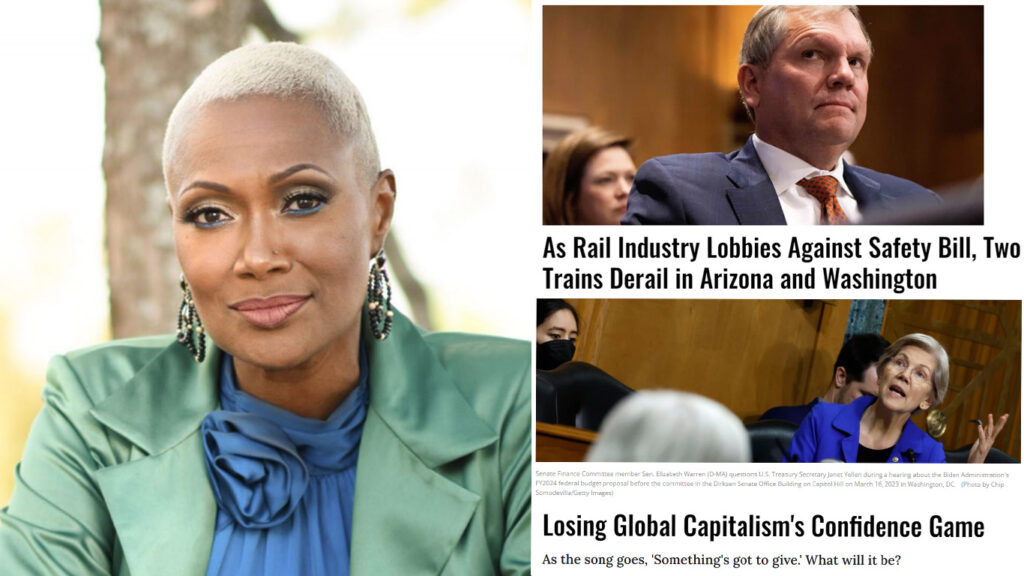Robert Reich’s on Losing Global Capitalism’s Confidence Game. Rep. Jolanda Jones explains the TEA HISD takeover and solutions. Even as more derailments occur, lobbyists stymy regulations.
Rep. Jolanda Jones on TEA HISD takeover.
Representative Jolanda Jones visits Politics Done Right to discuss the recent TEA takeover of HISD. But Jones is not giving up. She said that they found an exception in the law that they could work with to prevent the takeover.
Derailments persist as lobbyist work.
Some corporations have no shame. It is always about the mighty profit over anything, including human life. Even as derailments continue with a large frequency, rail company lobbyists are bribing Congress to stop toughing up regulations,
CommonDreams reported the following.
With each derailment since early February, calls for substantive action in Congress to rein in the powerful industry have grown louder.
Under pressure from rail workers and others, a bipartisan group of lawmakers introduced legislation earlier this month that would impose stronger regulations on trains carrying hazardous materials—an effort that rail industry lobbying has defeated in the past.
While rail unions welcomed some provisions of the bill as decent starting points, they warned the measure has major loopholes and exceptions that rail giants wouldn’t hesitate to exploit.
“If the language is not precise, the Class 1 railroads will avoid the scope of the law without violating the law, yet again putting the safety of our members and American communities into harm’s way,” said Eddie Hall, national president of the Brotherhood of Locomotive Engineers and Trainmen. “You can run a freight train through the loopholes.”
Predictably, the rail industry is working to further water down the legislation or kill it entirely, pumping donations to Republican allies and running ads in major media outlets touting its supposedly ironclad commitment to safety.
Sludge’s David Moore reported earlier this week that the PAC for Union Pacific—one of the largest Class 1 railroads in the U.S.—”made $15,000 in contributions last month, all to Republicans in the House and Senate, given less than two weeks after the Ohio derailment.”
“Several House Republicans on committees that oversee transportation have sought to delay the bipartisan legislation to boost rail safety rules,” Moore noted, “saying more information is needed after a potentially-lengthy study.”
Rep. Troy Nehls (R-Texas), chair of the House Transportation and Infrastructure Subcommittee on Railroads, Pipelines, and Hazardous Materials, parroted industry talking points earlier this month when making the case against regulatory action, saying U.S. railroads have a “very high success rate of moving hazardous material—to the point of 99-percent-plus.”
Days before Nehls’ comment, the Association of American Railroads (AAR) declared in an ad appearing in a Politico newsletter that “while 99.9 percent of all hazmat shipments that move by rail reach their destination safely, we know a single incident can have significant impacts.”
The AAR has dismissed demands for comprehensive rail safety reforms as “political.”
What will it take to make corporations more responsible? We must talk about that.
Capitalism confidence.
Former Clinton Labor Secretary is no communist. I have interviewed him several times, and he is, in fact, a capitalist. I don’t always agree with him because, for him and too many, it is more dogma & severe pragmatism than reality and practicality and absolute math. Recently, Reich wrote the following.
The financial system is facing a crisis of confidence. Finance ultimately depends on confidence—confidence that prices are under control, and confidence that banks are sound.
But ever since the near meltdown of Wall Street in 2008, followed by the milquetoast Dodd-Frank regulation of 2010 and the awful 2018 law exempting smaller banks, confidence in America’s banks has been shaky.
November’s revelation that the bitcoin giant FTX was nothing but a Ponzi scheme has contributed to the fears. Where were the regulators? Last Friday’s revelation that Silicon Valley Bank didn’t have enough capital to pay its depositors has added to the anxieties. Where were the regulators?
Credit Suisse has been battered by years of mistakes and controversies. It is now on its third CEO in three years. Why? Swiss banking regulations are notoriously lax, but American bankers have also pushed Europeans to relax their financial regulations, setting off a race to the bottom where the only winners are the bankers. As Lloyd Blankfein, then CEO of Goldman Sachs, warned Europeans, “operations can be moved globally and capital can be accessed globally.”
One advantage of being a bank (whether headquartered in Silicon Valley or Switzerland) is you get bailed out when you make dumb bets. Another is you can choose where around the world to make dumb bets. Which is why central banks and bank regulators around the world must coordinate with each other to ensure that instead of a race to the bottom, it’s a race to protect the public.
**
Banking is a confidence game. If the public loses confidence in banks, the financial system can’t function.
In the Panic of 1907, when major New York banks were heading toward bankruptcy, Secretary of the Treasury George B. Cortelyou deposited $35 million of federal money in the banks. It was one of the earliest bank bailouts, designed to restore confidence.
But it wasn’t enough. J.P. Morgan (the man who founded the bank) organized the nation’s leading financiers to devise a private bailout of the banks, analogous to yesterday’s. They redirected money between banks, secured further international lines of credit, and bought up the plummeting stocks of healthy corporations.
Confidence was restored, but the underlying weaknesses of the financial system remained. Those weaknesses became painfully and irrevocably apparent in the Great Crash of 1929.
If the success of an economic system is based on confidence and not math, how real is it?
Viewers are encouraged to subscribe and join the conversation for more insightful commentary and to support progressive messages. Together, we can populate the internet with progressive messages that represent the true aspirations of most Americans.

